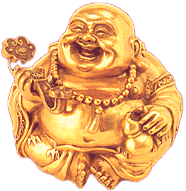|
|



|
Random Image
The Dhammapada
Chapter Five: The Fool
Night is long for one lying awake.
Seven miles is long for one exhausted.
Samsara is long for fools
Ignorant of true Dharma.
If, while on your way,
You meet no one your equal or better,
Steadily continue on your way alone.
There is no fellowship with fools.
A fool suffers, thinking,
"I have children! I have wealth!"
One's self is not even one's own.
How then are children? How then is wealth?
A fool conscious of her foolishness
Is to that extent wise.
But a fool who considers himself wise
Is the one to be called a fool.
A fool associating with a sage,
Even if for a lifetime,
Will no more perceive the Dharma
Than a spoon will perceive the taste of soup.
A discerning person who associates with a sage,
Even if for a brief moment,
Will quickly perceive the Dharma,
As the tongue perceives the taste of soup.
Fools with no sense,
Go about as their own enemies,
Doing evil deeds that
Bear bitter fruit.
No deed is good
That one regrets having done,
That results in weeping
And a tear-streaked face.
A deed is good
That one doesn't regret having done,
That results in joy
And delight.
As long as evil has not borne fruit,
The fool thinks it is like honey.
But when evil does bear fruit,
Then the fool suffers.
The foolish ascetic who month after month
Eats food with the tip of a blade of grass
Is not worth a fraction
Of a person who has fathomed the Dharma.
Like fresh milk,
Evil deeds do not immediately curdle;
Rather, like fire covered with ash,
They follow the fool, smoldering.
Reasoning is harmful
To fools;
It ruins their good fortune
And splits open their heads.
Fools will want unwarranted status,
Deference from fellow monks,
Authority in the monasteries,
And homage from good families.
"Let both householders and renunciants
Believe that I did this.
Let them obey me in every task!"
Such are the thoughts of a fool
Who cultivates desire and pride.
The way to material gain is one thing,
The path to Nirvana another.
Knowing this, a monk who is the Buddha's disciple
Should not delight in being venerated,
But cultivate solitude instead.
...excerpt from The Dhammapada
Continue to Chapter Six...



Contact • Feedback • Typo • Privacy • Home